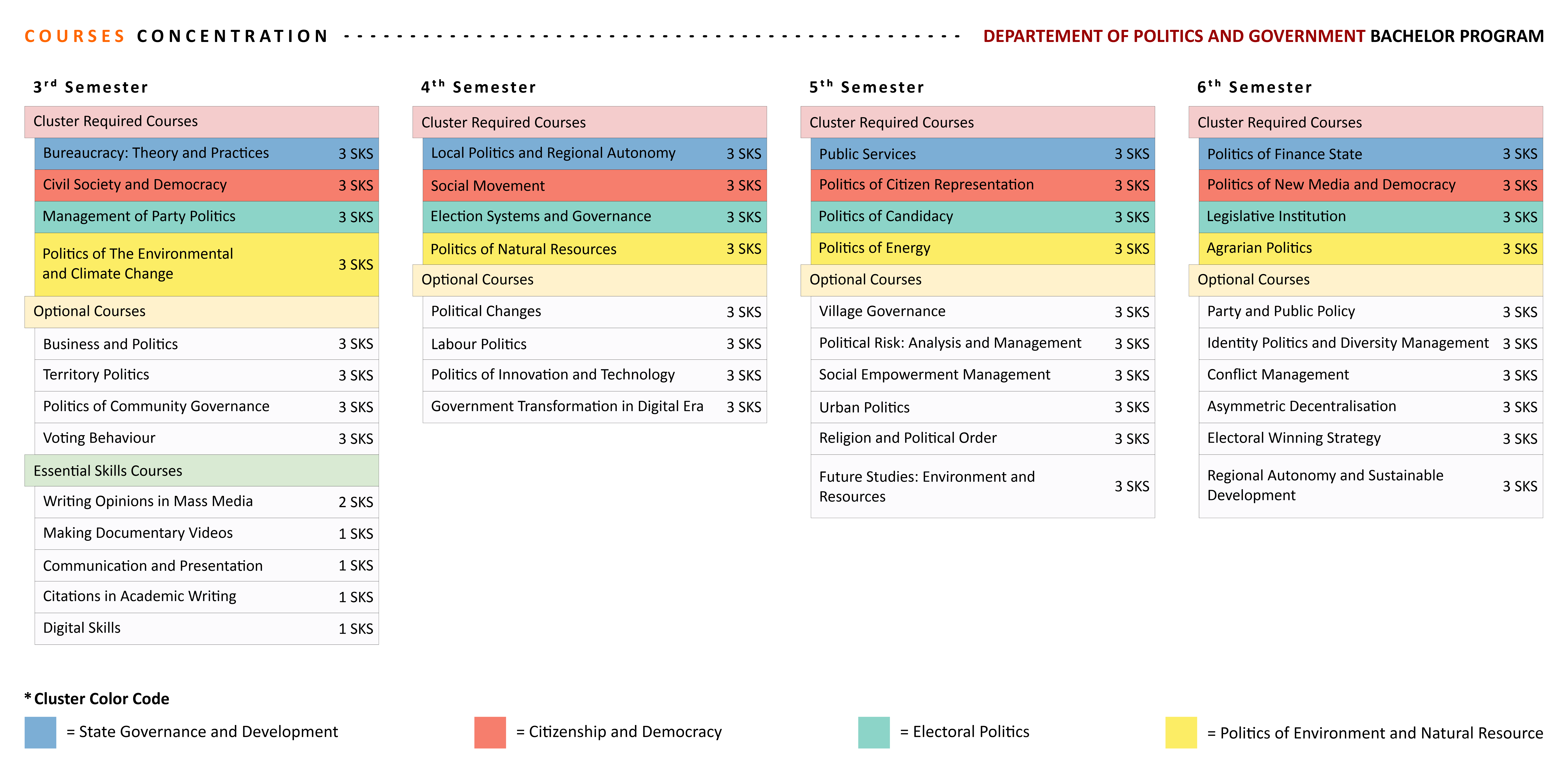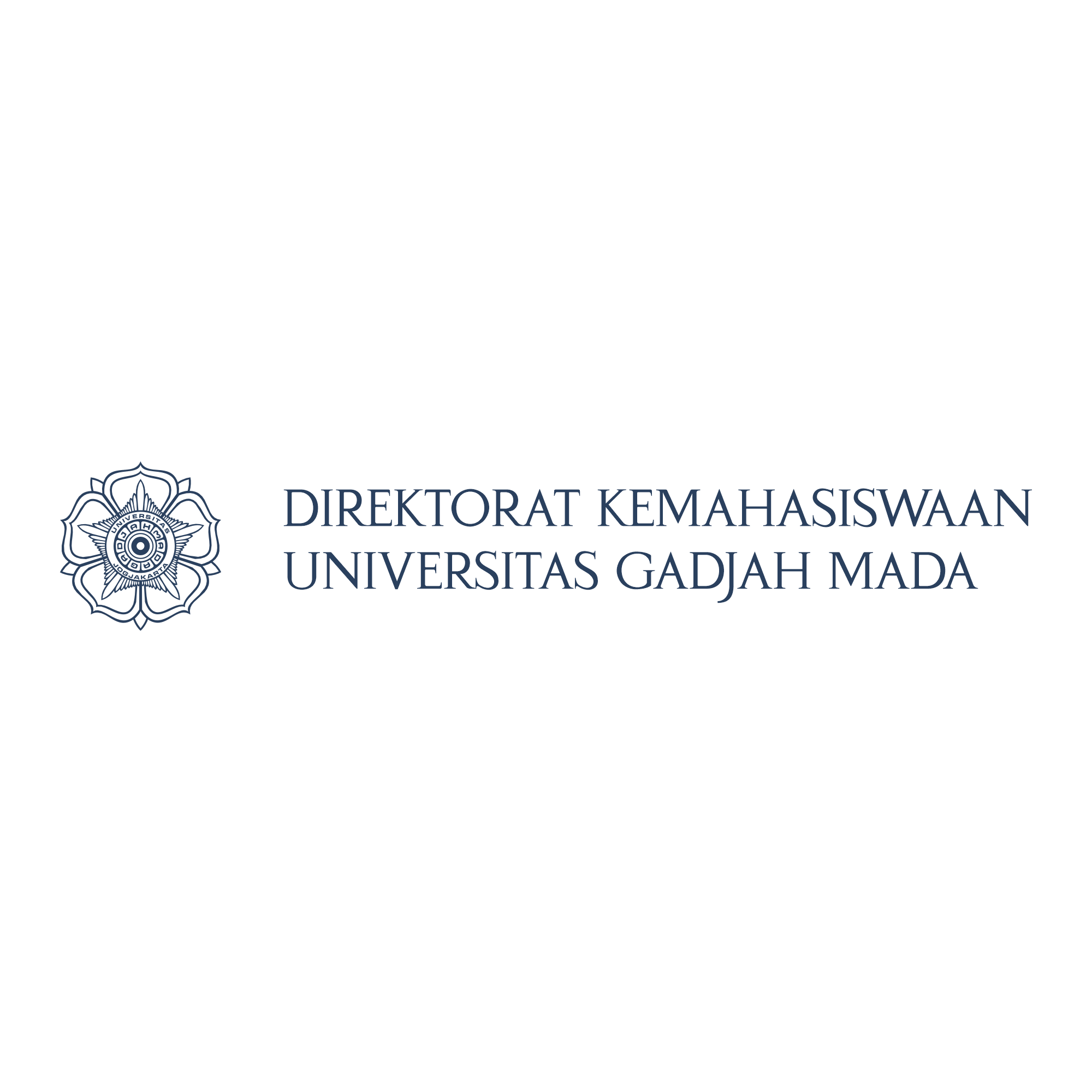Prospective Students
UNDERGRADUATE PROGRAM /
Bachelor of Politics and Government (BPG)
CAPACITY
Enrollment to Bachelor of Politics and Government (BPG) UGM is consist of four types of admissions, namely, Seleksi Nasional Masuk Perguruan Tinggi Nasional (SNMPTN), Seleksi Bersama Masuk Perguruan Tinggi Nasional (SBMPTN), Ujian Mandiri UGM Jalur Prestasi, and Ujian Mandiri UGM Computer Based Test (CBT).
Seleksi Nasional Perguruan Tinggi Nasional (SNMPTN)
Seleksi Bersama Masuk Perguruan Tinggi Nasional (SBMPTN)
Ujian Mandiri UGM Jalur Prestasi
Ujian Mandiri UGM Computer Based Test (CBT)
More detail information visit um.ugm.ac.id
Curriculums
The curriculum for the Bachelor Programme in Political Science and Governance (BPG) at UGM uses the 2016 curriculum, which is currently in effect. Students are required to enroll 144 credits during their studies period. The courses offered are semi-packaged and consist of compulsory and elective courses. Compulsory courses come from compulsory university courses, faculties, and departments. While the elective courses consist of interest in state studies, intermediary, community, and general electives.
Freedom to Learn-Independent Campus (MBKM)
Undergraduate Program in Political Science and Governance UGM has implemented “Freedom to Learn-Independent Campus” (MBKM) as one of the learning methods for students. MBKM is a comprehensive career preparation program as part of the policy of the Ministry of Education, Culture, Research, and Technology of the Republic of Indonesia. Through the MBKM scheme, students can gain knowledge, experience and skills outside of conventional learning methods. There are several programs offered in MBKM, including:
INTERNSHIP
The MBKM Internship Program enables students to carry out internships in institutions engaged in political science and/or government science in order to reflect on the theory they have learned in class. In addition, students can also take advantage of the knowledge and experience gained from internship activities to be included in a final project in the form of an internship thesis.
INDEPENDENT STUDY
The independent study program aims to provide opportunities for students to learn and develop themselves through activities outside the lecture class, but are still recognized as part of the lecture. This activity is carried out for one to two semesters and can be done independently or in groups to create innovative works, participate in departmental projects/activities or be involved in competitions at the national/international level.
RESEARCH
In the research program, students can participate in research projects at research institutions. Through this program, students can hone skills, gain experience and hone data analysis skills.
Indonesian International Student Mobility Awards
Students can study 1 semester at a university in another country to gain new knowledge and experience while living in another country.
Kampus Mengajar
Students have the opportunity to teach in elementary and junior high schools so that they can share their knowledge and provide inspiration for elementary and middle school students. Kampus Mengajar is one of the MBKM programs, which strives to offer students opportunities to learn and develop their potential outside of the classroom.
Membangun Desa (KKN Tematik)
Students have the opportunity to contribute to the development and empowerment of rural communities, as well as to learn directly from the community.
Pejuang Muda Kampus Merdeka
This program provides space for students to apply their knowledge by collaborating with local governments, community leaders and religious leaders in the region.
Merdeka Student Exchange
Students can study at other campuses, as well as learn about the culture of the archipelago and build friendships with students at other universities.
Merdeka Entrepreneur
Students who have an interest in the world of entrepreneurship can increase capacity, gain experience, as well as build sustainable entrepreneurial innovation ideas.
Humanity Project
Through this program, students can develop humanitarian activities to address social issues.
The above programs such as research, activism, internships, achievements, which have been carried out by students can be claimed as semester credits through a recognition scheme. This mechanism opens up opportunities for off-campus student activities to be equalized in credits.
The Undergraduate Program in Political Science and Government utilizes Uang Kuliah Tunggal (UKT) system, which the Universitas Gadjah Mada has established in the Keputusan Rektor UGM nomor 1032/UN1.P/KPT/HUKOR/2021, is divided into these brackets:
The categories of UKT for each student are determined based on the total gross income and additional earnings of students’ parents or legal guardians. Students may also apply for UKT waivers to the Faculty with the terms and conditions set by the Faculty.
Various scholarship opportunities are also open to prospective students, ranging from Bidikmisi which is a tuition assistance for prospective students who are economically disadvantaged and have good academic potential to pursue higher education, to scholarships from collaboration between institutions outside of UGM. Information on scholarship opportunities can be accessed via ditmawa.ugm.ac.id/kesejahteraan
Universitas Gadjah Mada supports and facilitates teaching and learning activities to the welfare of students with facilities such as:
1. UGM Central Library
Students can access various reading materials, including journals, articles, final assignments, and books through ugm.ac.id for free. This supports students in obtaining references for lecture reading materials to final project work. For more information please visit lib.ugm.ac.id.
2. UGM Local Transportation
The campus bicycle service can be accessed by students, lecturers, and staff, as well as guests at UGM. This service can be enjoyed to get around the UGM environment while implementing a healthy lifestyle. For more information please visit sepedakampus.ugm.ac.id.
3. UGM Student Dorm
UGM has several female and male dormitories located at strategic points around UGM. This dormitory facility can be used by new students who have passed the UGM entrance selection. For more information about this facility, please visit residence.ugm.ac.id.
4. Health Facilities
One of the health facilities provided by UGM, which is a favorite for students, is the Gadjah Mada Medical Center (GMC). Some GMC services are free for the UGM community. For more information visit gmc.ugm.ac.id
5. Coworking Space
The Faculty of Social and Political Sciences of UGM provides a variety of coworking spaces that can be used by students to discuss, do assignments, and to be creative in creating multimedia. These spaces are called BRI Work, and Digilib. Visit Digilib virtually with the following show Visit Digilib Virtually
In S1 Politics and Government, students can learn about everything related to politics and government. In everyday life, many things are related or have a political dimension, such as social community, art, music and even religion. Of course, students will study the politics of state and government management. If you are interested in learning about elections, democracy and also state management, this place is the best.
The lecture process at the Political and Government Undergraduate Study Program is carried out both inside the classroom and outside the classroom. Students can study in the library, in the multimedia room and also through field trips to the object that is the topic of study. In general, students will complete their study period within 4 years.
There are three focuses of study that students can choose if they are studying here.
- State
This study focuses on state administration and policy-making in the legislative, executive and judicial fields. - Community
Students will learn more about community management, social movements, and student movements. - Intermediary
In the focus of this study, students will explore the processes and institutions that connect citizens with the state, such as elections, political parties, and civil society such as non-government organizations (NGOs).
Undergraduate Programs at the Department of Politics and Government have implemented Merdeka Learning, Merdeka Campus (MBKM) as one of the learning methods for students. MBKM is a comprehensive career preparation program as part of the policy of the Ministry of Education, Culture, Research, and Technology of the Republic of Indonesia. Through the MBKM scheme, students can gain knowledge, experience and skills outside of conventional learning methods. There are several MBKM Programs that students can choose from, such as Internships, Independent Study, Research, Student Exchange, Social Entrepreneurship, Village Development Projects, Teaching in Education Units, and Humanitarian Projects.
To be able to obtain a Bachelor of Political Science (SIP), students must take 145 credits. Generally, students take about 45 courses with an average weight of 3 credits for each course. Students are also required to complete the Community Service Program (KKN) and complete a final project.
The Department of Politics and Government offers two schemes for final project work for the Bachelor program, namely in the form of thesis writing or thesis writing.
Thesis is academic writing written by students based on the results of a research of 15,000-25,000 words. Thesis that is considered to meet the publication criteria and also get a high score has the opportunity to be published as a book by the Research Center for Politics and Government (PolGov).
Thesis work is a student’s final project to make journal articles, policy papers or policy briefs, internships and also to make films or video documentaries with predetermined standards for each form of work.
In addition to permanent lecturers, the lecture process for the Bachelor Program at the Department of Politics and Government also involves various experts, lecturers, visiting practitioners, researchers, academics from various fields. , as well as from government officials both centrally and regionally. The invited lecturers and experts also came from domestic and foreign institutions.




